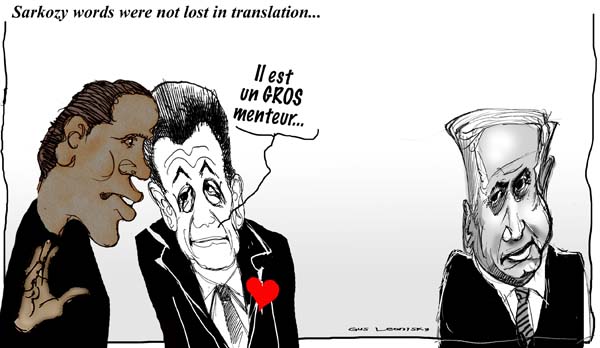
The American president only has one option remaining to stop the Iranian nuclear program: to succeed in convincing the world that he is “serious” and ready to attack.
Barack Obama has already lost one battle this month, or so his conservative militant right-wing critics think. John McCain, the senior senator from Arizona, who himself lost a battle that Obama actually won — the election three years ago — criticized the president twice within the space of a few days. Once was on his decision to withdraw all U.S. army forces from Iraq: “The Iranians are already hailing it as a great victory,” McCain harrumphed to those who would still to listen to him. The second time was yesterday, after details were leaked of the gossipy banter [criticizing Benjamin Netanyahu] between Obama and the French president, Nicolas Sarkozy. “[T]hat kind of comment is … indicative of some of the policies towards Israel that this administration has been part of,” he said.
As a matter of fact, Obama was relatively moderate, for the real insult to Netanyahu came from Sarkozy — the same Sarkozy who in a past leaked private conversation called Obama “weak, inexperienced and utterly immature.” It was also Sarkozy who threw the truth in his face two years ago, when they met at a conference in which the American president preached to the world about dismantling nuclear weapons.
“We are right to talk about the future,” scoffed the French president, “but before the future there is the present, and the present is two major nuclear crises.” He added: “We are living in a real world, not a virtual world.”
Bush and Cheney Didn’t Do Much More
And in this real world, an important thing happened yesterday: official recognition that Iran is indeed seeking military nuclear capability. Not that anyone with eyes in their head thought otherwise. And yet sometimes, to dispel the party atmosphere, it is necessary to remove masks.
What will Obama do with this important information? He must be as committed as his predecessor to attempting to prevent Iran’s military nuclear capability. But as his predecessor can say, even he tried and failed. George Bush and his deputy Richard Cheney, who ranted and raved about the Iranian nuclear threat in his book, did not do much more than Obama.
On the other hand, on their watch, no rogue state achieved nuclear capability without advance warning: The Indians and the Pakistanis showed Clinton their cards. North Korea mocked Clinton. Libya gave up because they were afraid of Bush. Syria took a pre-emptive strike with Bush’s approval. Perhaps it is random coincidence, or perhaps it is significant to the way in which the American president is perceived in countries that are uncertain whether to develop a nuclear program or not.
The International Community Is at a Crossroads
Before he decided to withdraw from Iraq to the glee of the Iranians, Obama was embroiled with the French and British adventure in Libya. Its success, in retrospect, has rebutted the source who described the administration as “leading from behind.” “This was a phrase that the media picked up on,” said the president. However, The New Yorker journalist, who published the “phrase,” insists [on Twitter]: “LFB quote is from WH official.”
Either way, in the Iranian case, there is no one else who will lead — only Obama. The decision whether to risk a confrontation or a war will be his. Politically, it is doubtful that he has anything to lose from such a decision, but voters would like to believe that a decision of this type is not made for political reasons.
Materially, it is already obvious to everyone that the international community has reached a T-junction: To turn right would be to use much more force than has been done up to now; to turn left would be to resign itself to another Iranian victory in the Middle East. There is no stopping at this junction, which Obama also understands. There are only a few tools left for the American president to stop Iran. Severe sanctions are completely unenforceable without cooperation — which is not forthcoming — from China and Russia. Persuasion has already been attempted. The Arab Spring is turning to autumn — and has skipped Tehran.
Only one option remains for Obama: convince the rest of the world that he is prepared to attack the one he “has to deal with every day,” so that he himself doesn’t attack [Iran]; the one who called him “weak,” so that we can continue to trust the American leadership; and the one who said that Obama “doesn’t even know how to spell his own name properly”: Mahmoud Ahmadinejad. Perhaps if he can persuade, he won’t have to attack.

Leave a Reply
You must be logged in to post a comment.